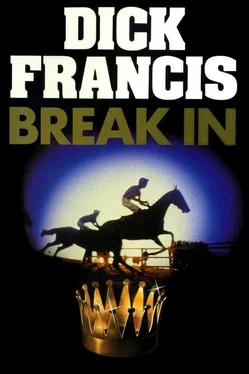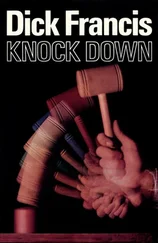Holly came downstairs looking wan but more cheerful, Bobby returned from the Heath with reviving optimism, and I found the necessity of demolishing their fragile recovery just one more reason to detest the Flag .
Holly began to cry quietly and Bobby strode about the kitchen wanting to smash things, and still there was the unanswerable question: Why?
‘This time,’ I said, ‘you consult your lawyer, and to hell with the cost. Also this time we are going to pay all your worst bills at once, and we are going to get letters from all your creditors saying they have been paid, and we’ll get those letters photocopied by the dozen, and we’ll send a set of them out to everyone who got a copy of the Flag , and to the Flag itself, to Sam Leggatt, the editor, special delivery, and to all the owners, and to anyone else we can think of, and we’ll accompany these with a letter of your own saying you don’t understand why the Flag is attacking you but the attacks have no foundation, the stable is in good shape and you are certainly not going out of business.’
‘But,’ Holly said, gulping, ‘the bank manager won’t honour our cheques.’
‘Get the worst bills,’ I said to Bobby, ‘and let’s have a look at them.’ Specially the blacksmith, the vets and the transport people. We’ll pay those and any others that are vital.’
‘What with?’ he said irritably.
‘With my money.’
They were both suddenly still, as if shocked, and I realised with a thrust of pleasure that that plain solution simply hadn’t occurred to them. They were not askers, those two.
Holly couldn’t disguise her upsurge of hope, but she said doubtfully, ‘Your new house, though. It must be taking you all you’ve saved. You haven’t been paid for the cottage yet.’
‘There’s enough,’ I assured her. ‘And let’s get started because I’ll have to be off to Plumpton pretty soon.’
‘But we can’t...’ Bobby said.
‘Yes, you must. Don’t argue.’
Bobby looked pole-axed but he fetched the bunch of accounts and I made out several cheques.
‘Take these round yourself this morning and get watertight receipts, and in a minute we’ll write the letter to go with them,’ I said. ‘And see if you can get them all photocopied and clipped into sets in time to catch this afternoon’s post. I know it’s a bit of a job, but the sooner very much the better, don’t you think?’
‘And one set to Graves?’ Bobby asked.
‘Certainly to Graves.’
‘We’ll start immediately,’ Holly said.
‘Don’t forget the feed-merchant,’ I said. ‘He’ll write you something good. He didn’t like being made use of by the Flag .’
‘I don’t like to mention it...’ Holly began slowly.
‘The bank?’ I asked.
She nodded.
‘Leave the bank for now. Tomorrow maybe you can go to the manager with a set of letters and see if he will reinstate you. He darned well ought to. His bank’s making enough out of you in interest, especially on the yearling loans. And you do still have the yearlings as security.’
‘Unfortunately,’ Bobby said.
‘One step at a time,’ I said.
‘I’ll telephone my solicitor straight away,’ he said, picking up the receiver and looking at his watch. ‘He’ll be in by now.’
‘No, I shouldn’t,’ I said.
‘But you said...’
‘You’ve got an informant right inside this house.’
‘What do you mean?’
‘Your telephone,’ I said, ‘I should think.’
He looked at it with disgusted understanding and in a half-groan said, ‘Oh, God.’
‘It’s been done before,’ I said: and there had in fact been a time in Lambourn when everyone had been paranoid about being overheard and had gone to elaborate lengths to avoid talking on their home telephones. Illegal it might well be to listen uninvited, but it was carried on nevertheless, as everyone knew.
Without more ado we unscrewed all the telephones in the house, but found no limpet-like bugs inside. Horses, however, not electronics, were our speciality, and Bobby said he would go out to a public box and ring up the telephone company and ask them to come themselves to see what they could find.
It happened at one point that Bobby was on his knees by the kitchen wall screwing together the telephone junction there and Holly and I were standing side by side in the centre of the room, watching him, so that when the newcomer suddenly arrived among us unannounced it was my sister and I that he saw first.
A tall man with fair hair fading to grey, immensely well brushed. Neat, good-looking features, smoothly shaven rounded chin; trim figure inside a grey City suit of the most impeccable breeding. A man of fifty, a man of power whose very presence filled the kitchen, a man holding a folded copy of the Daily Flag and looking at Holly and me with open loathing.
Maynard Allardeck; Bobby’s father.
Known to me, as I to him, as the enemy. Known to each other by frequent sight, by indoctrination, by professional repute. Ever known, never willingly meeting.
‘Fieldings,’ he said with battering hate; and to me directly, ‘What do you think you’re doing in this house?’
‘I asked him,’ Bobby said, straightening up.
His father turned abruptly in his direction, seeing his son for the first time closely face to face for more than four years.
They stared at each other for a long moment as if frozen, as if re-learning familiar features, taking physical stock. Seeing each other perhaps as partial strangers, freshly. Whatever any of us might have expected or wished for in the way of reconciliation, it turned out to be the opposite of what Maynard had in mind. He had come neither to help nor even to commiserate, but to complain.
Without any form of greeting he said, ‘How dare you drag me into your sordid little troubles.’ He waved his copy of the Flag . ‘I won’t have you whining to the Press about something that’s entirely your own fault. If you want to marry into a bunch of crooks, take your consequences and keep me out of it.’
I imagine we all blinked, as Bobby was doing. Maynard’s voice was thick with anger and his sudden onslaught out of all proportion, but it was his reasoning above all which had us stunned.
‘I didn’t,’ Bobby said, almost rocking on his feet. ‘I mean, I haven’t talked to the Press. I wouldn’t. They just wrote it.’
‘And this part about me refusing you money? How else would they know, if you hadn’t told them? Answer me that.’
Bobby swallowed. ‘You’ve always said... I mean, I thought you meant it, that you wouldn’t.’
‘Of course I mean it.’ His father glared at him. ‘I won’t. That’s not the point. You’ve no business snivelling about it in public and I won’t have it. Do you hear?’
‘I haven’t,’ Bobby protested, but without conviction.
I thought how much father and son resembled each other in looks, and how little in character. Maynard had six times the force of Bobby but none of his sense of fair play. Maynard could make money work for him, Bobby worked to be paid. Maynard could hold a grudge implacably for ever, Bobby could waver and crumble and rethink. The comparative weaknesses in Bobby, I thought, were also his strength.
‘You must have been blabbing.’ Maynard was uncompromisingly offensive in his tone, and I thought that if Bobby ever wanted to announce to the whole world that his father would let him sink, he would have every provocation and every right.
Bobby said with a rush, ‘We think someone may have been tapping our telephone.’
‘Oh, you do, do you?’ Maynard said ominously, casting an angry look at the silent instrument. ‘So it’s on the telephone you’ve been bleating about me, is it?’
Читать дальше




